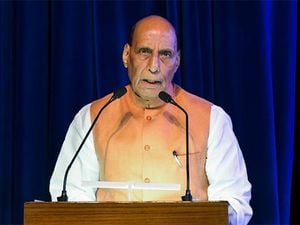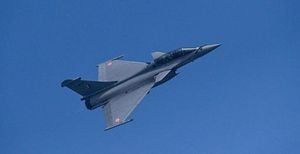The landscape of artificial intelligence (AI) development is undergoing significant upheaval as the United States grapples with its export control policies aimed at curbing China’s technological advancements. The latest round of restrictions, initiated under the Biden administration and now being scrutinized by the Trump administration, has raised questions about the effectiveness and consequences of such measures.
In a recent regulatory filing, U.S. chipmaker Nvidia disclosed that it expects to incur costs of up to $5.5 billion due to new export controls that require the company to obtain a special license to sell its H20 chips in China. This announcement sent Nvidia's stock tumbling more than 6 percent, sending ripples through the semiconductor industry. The Trump administration's new rule aims to prevent these chips from being used in supercomputers in China, marking another effort to slow China's AI development.
The ongoing debate surrounding U.S. restrictions on Chinese technology has intensified, particularly in light of significant milestones achieved by China this year, including the launch of the advanced AI model DeepSeek-R1 and notable advancements in semiconductor technology by Huawei. As these developments unfold, experts and policymakers are questioning whether it is too late for the U.S. to maintain its lead in AI technology or if a more collaborative approach with China might be necessary.
Nvidia's H20 chip was created as a workaround for previous U.S. government restrictions on another chip, the H800, which the Biden administration banned from sale to China in October 2023. The H20 was designed to comply with existing export regulations, yet the recent restrictions have effectively barred its export, raising concerns about the impact on U.S. competitiveness and the acceleration of China’s efforts to develop a self-sufficient chip industry.
Historically, the U.S. has taken a hard stance against Chinese tech companies. The Trump administration was the first to impose restrictions on Huawei’s access to semiconductor chips and other U.S. technology in 2019. The Biden administration expanded these restrictions in 2022, aiming to curb China’s access to advanced AI chips and related technologies.
However, the recent unveiling of DeepSeek's R1 language model, which showcased capabilities rivaling those of U.S. leader OpenAI, has raised alarms in Washington. Experts argue that the success of DeepSeek was facilitated by American chips, as the company stockpiled Nvidia’s H800 and H20 GPUs before the Biden administration implemented its restrictions. This situation has led to a perception that U.S. export controls may be inadvertently spurring innovation within Chinese companies.
“Here in China, DeepSeek has really encouraged people who pay attention to AI development, because they believe it shows that even under sanctions and different kinds of embargoes of the United States, a Chinese company can still find a way to catch up,” said Xiao Qian, vice dean of the Institute for AI International Governance at Tsinghua University.
China’s advancements in AI are not limited to DeepSeek. The country’s top AI models are rapidly closing the gap with their U.S. counterparts, according to benchmarking by Stanford University. Kai-Fu Lee, CEO of the investment firm 01.AI, recently stated that Chinese AI companies now lag behind U.S. firms by only three months in core technologies.
Furthermore, Huawei is preparing to launch its new Ascend 910c AI chip as early as May 2025, which is expected to perform on par with Nvidia’s H100 chip but at a significantly lower cost. This move is indicative of China’s broader strategy to enhance its semiconductor capabilities and reduce reliance on foreign technology.
Despite the challenges posed by U.S. export restrictions, experts argue that Chinese companies are innovating rapidly across all layers of the chip ecosystem. Companies like Biren Technology and Enflame are designing AI chips, while Semiconductor Manufacturing International Corporation (SMIC) is reportedly nearing the ability to produce 5nm chips, an improvement over its current 7nm technology.
The Biden administration's export control policy has been criticized for being overly broad and counterproductive. The restrictions, initially aimed at preventing Chinese military access to advanced AI technology, have inadvertently isolated U.S. firms from global markets. As a result, American companies are increasingly cut off from lucrative opportunities, while Chinese firms gain an advantage.
“The restrictions on the H20 are a particularly egregious example of the ‘small gain, high cost’ policy the U.S. has pursued with respect to U.S. hardware companies and China,” remarked Paul Triolo, a partner at DGA-Albright Stonebridge Group.
The U.S. government's approach has raised concerns about its long-term viability. While proponents argue that export controls are necessary for national security, critics warn that they risk undermining American innovation and competitiveness in the global market. The uncertainty created by rapid policy shifts can discourage U.S. companies from investing in research and development, which could ultimately hinder their ability to compete with Chinese counterparts.
Looking ahead, the Trump administration faces the challenge of finalizing the AI diffusion rule, which divides countries into three tiers of access to advanced U.S. AI technology. This framework, set to take effect on May 15, 2025, has already sparked concerns among U.S. companies that rely on global markets for growth.
“If the United States wants to maintain long-term leadership in AI and semiconductors, it should establish a clear and sustainable policy that protects national security without stifling innovation or isolating U.S. companies from the global economy,” noted an industry analyst. “This effort cannot be a U.S.-only endeavor; it should engage and deliver benefits for allies as well.”
In conclusion, the U.S. faces a pivotal moment in its approach to AI export controls and its broader strategy for maintaining technological leadership. As China continues to make strides in AI development, the effectiveness of U.S. policies will be tested in the coming months, with potential implications for both national security and economic interests.



